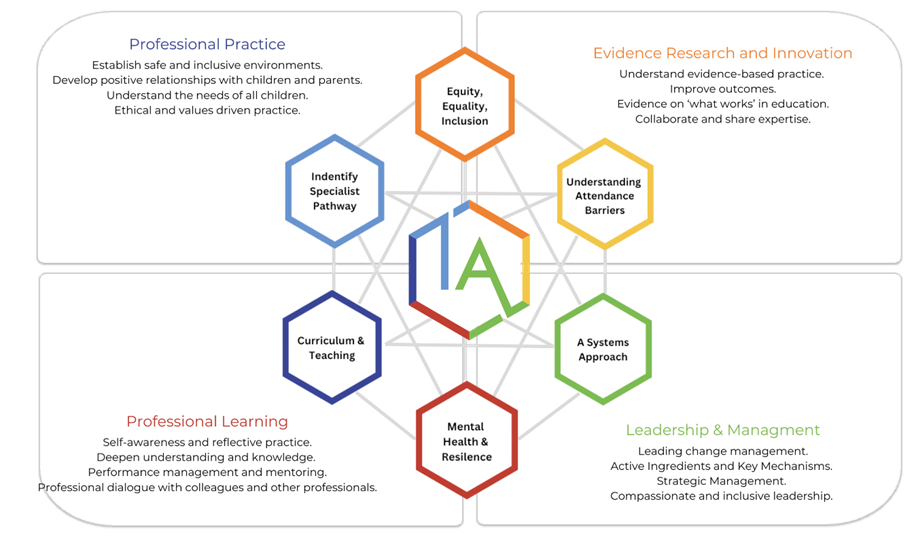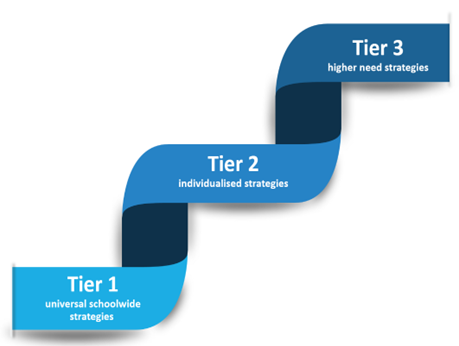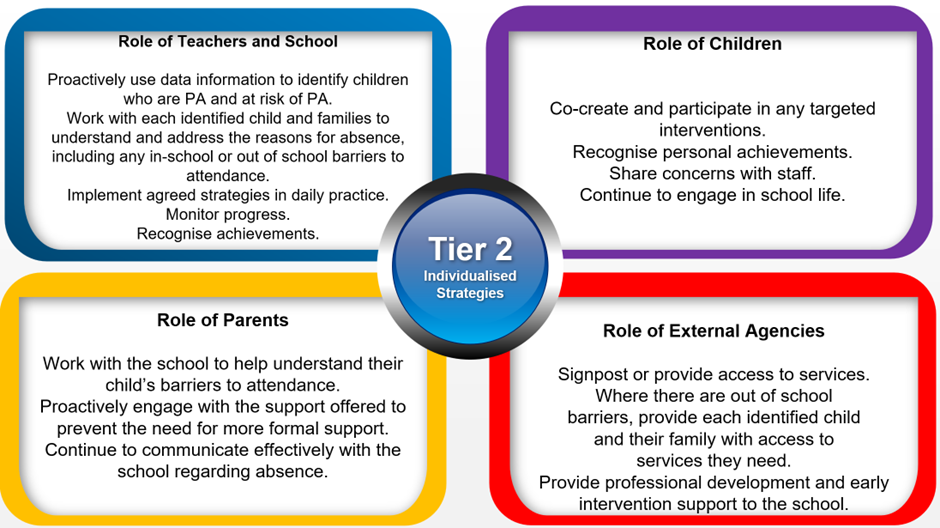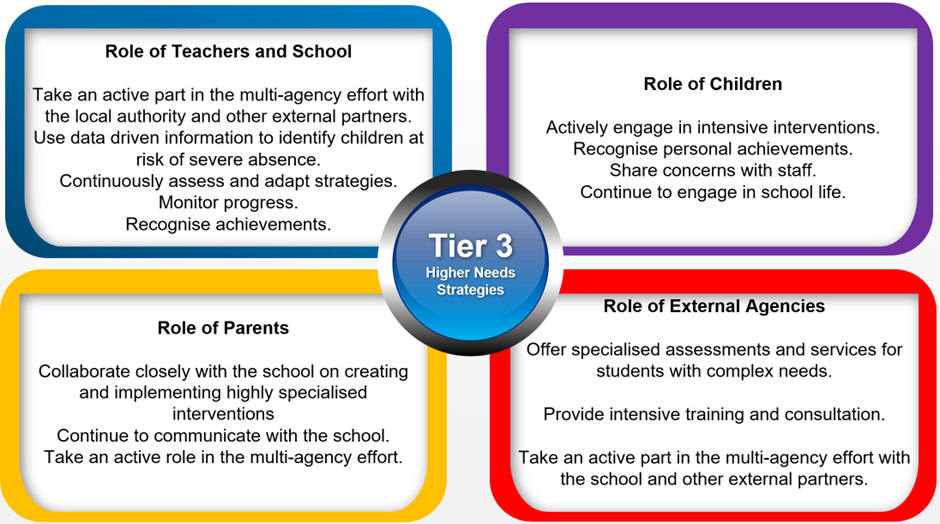Attendance
Kensington Junior Academy is proudly recognised as an Inclusive Attendance school. Our unwavering commitment to attendance centres around child-centric actions, evidence-informed practices, and a shared understanding of everyone's roles and collective responsibilities to promote exceptional attendance.
Inclusive Attendance Professional Development Model
Our attendance approach is fundamentally guided by the Inclusive Attendance professional development model. Comprising six tailored Learning Modules, this model empowers us to deepen our understanding by facilitating continuous professional learning for all staff. Within this model, the four domains of practice ensure the provision of professional learning, professional development, evidence-based practices, and exemplary leadership and management to seamlessly integrate theory into practice.

Annual Inclusive Attendance 7-Month Development Programme
Year after year, we review and further enhance our attendance practices through dedicated participation in the Inclusive Attendance 7-month development programme. This investment allows us to remain at the forefront of educational change and extends unparalleled support to our children and their families, equipping them with access to the finest possible assistance.
Multi-Tiered System of Support
To guarantee a comprehensive approach to attendance, we implement a Multi-Tiered System of Support. A Multi-Tiered System of Support (MTSS) for school attendance involves three tiers of intervention, with roles for teachers, the school, children, parents, and external agencies – including the Local Authority. Data-driven decision-making and training requirements are pivotal to the implementation of the system. The system aligns with the Department for Education's (DFE) "Working Together to Improve School Attendance" guidelines.

Tier 1 - Universal Approach: Establishing a baseline universal attendance approach that benefits all children.

Tier 2 - Individualised Strategies and Early Help Support: Tailoring strategies to individual needs and providing early help support for persistent attendance challenges.

Tier 3 - Higher Needs Strategies Support: Furnishing specialised support for children, young people, and families with complex attendance requirements, including access to external agency support when necessary.

Recognition-Based Approach
Our attendance philosophy is rooted in a recognition-based approach that recognises both personal and collective achievements. This approach serves to thwart isolation, prevent victimisation, cultivate positive environments, nurture relationships, foster inclusivity, and ultimately cultivate intrinsic motivation among our children, families, and staff. At Kensington Junior Academy we value and celebrate good attendance, recognising both pupils and parents for their efforts in ensuring regular school attendance.
Our approach includes:
📮 Postcards Home – Each term, we send a special postcard to parents, thanking them for their support with attendance. Whether it’s achieving 100%, showing improvement, or demonstrating great effort, we believe recognition matters.
🏅 Spontaneous Recognition – Teachers have blank certificates in class, ready to award pupils for improved attendance, consistent effort, full weeks in school, or zero lates.
⭐ Attendance & Core Values – Our school’s values and points system incorporate attendance, reinforcing its importance in our everyday learning culture.
📞 Positive Phone Calls Home – Teachers personally call home to celebrate attendance achievements.
🦘 Kip the Kensington Kangaroo – “Hop to It – Every Day Counts!”
Kip, our friendly and energetic school attendance mascot, reminds pupils that showing up every day keeps them on track for success.
- A physical soft toy kangaroo, working just like our KJA bears.
- Posters around school featuring Kip, inspiring pupils to make every day count!

The Importance of School Attendance
School attendance is not merely a requirement but a fundamental pillar of education. It plays a pivotal role in shaping academic success, personal growth, and future prospects, making it an indispensable aspect of any educational system.
- Academic Achievement: Regular attendance directly correlates with academic success. Children who attend school consistently are more likely to keep up with the curriculum, perform better in exams, and improve their life outcomes.
- Knowledge Acquisition: School is where children acquire knowledge and skills that are crucial for their personal and professional growth. Missing days means missing out on valuable learning opportunities.
- Social Development: School provides a vital social environment for children and adolescents to interact with peers, develop friendships, and learn essential social skills. Consistent attendance ensures children remain connected to their peer group.
- Building Routine: School attendance establishes a structured routine in children’s lives, teaching them time management and responsibility, which are valuable life skills.
- Teacher Interaction: Regular attendance allows for meaningful teacherchild interactions. Teachers can provide personalised support, address questions, and assess individual progress more effectively when children attend regularly.
- Preventing Knowledge Gaps: Frequent absences can lead to significant knowledge gaps, making it challenging for children to catch up with missed lessons, potentially resulting in longterm academic struggles.
- School Engagement: Children who attend school regularly are more likely to engage in extracurricular activities, sports, and other enriching experiences that contribute to their overall development.
- Legal and Parental Responsibility: Parents or guardians are legally responsible for ensuring their child's regular school attendance. Failing to do so can lead to legal consequences.
- Community Wellbeing: High levels of school attendance contribute to the overall wellbeing of communities.
Holidays in Term Time
- In September 2013 the Education (Pupil Registration)(England) (Amendment) Regulations 2013 came into force. These regulations make it clear that Headteachers should not grant approval for any leave of absence during term-time, including holidays, unless there are exceptional circumstances.
- Any requests should be on an official school absence request form and handed into the school office for consideration prior to any holiday/leave arrangements being made - at least 10 school days before the holiday is planned.
- You may be issued with a Penalty Notice should leave be taken which is not authorised. This will be issued from the Local Education Authority Education Welfare Service.
In the first instance, the fine is £160 to be paid within 28 days. The 28 days starts two days after the date of issue as shown on the notice. If the fine is paid within 21 days, payment reduces to £80. If a second penalty notice is issued within 3 years of the first the amount to be paid is £160 to be paid within 28 days with no reduction for early payment. PLEASE BE AWARE when two parents/carers are issued with a penalty notice for the same child both penalty notices must be paid. The fine will apply to each parent for each child.

Our Attendance Policy can be found on the Academy Policies page.
